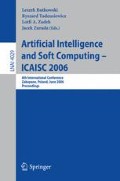Abstract
In the paper a new evolutionary algorithm for global induction of linear trees is presented. The learning process consists of searching for both a decision tree structure and hyper-plane weights in all non-terminal nodes. Specialized genetic operators are developed and applied according to the node quality and location. Feature selection aimed at simplification of the splitting hyper-planes is embedded into the algorithm and results in elimination of noisy and redundant features. The proposed approach is verified on both artificial and real-life data and the obtained results are promising.
Access this chapter
Tax calculation will be finalised at checkout
Purchases are for personal use only
Preview
Unable to display preview. Download preview PDF.
References
Blake, C., Keogh, E., Merz, C.: UCI repository of machine learning databases, Irvine, CA: University of California, Dept. of Computer Science (1998), http://www.ics.uci.edu/~mlearn/MLRepository.html
Bot, M., Langdon, W.: Application of genetic programming to induction of linear classification trees. In: Poli, R., Banzhaf, W., Langdon, W.B., Miller, J., Nordin, P., Fogarty, T.C. (eds.) EuroGP 2000. LNCS, vol. 1802, pp. 247–258. Springer, Heidelberg (2000)
Breiman, L., Friedman, J., Olshen, R., Stone, C.: Classification and Regression Trees, Wadsworth Int. Group (1984)
Cantu-Paz, E., Kamath, C.: Inducing oblique decision trees with evolutionary algorithms. IEEE Transactions on Evolutionary Computation 7(1), 54–68 (2003)
Chai, B., Huang, T., Zhuang, X., Zhao, Y., Sklansky, J.: Piecewise-linear classifiers using binary tree structure and genetic algorithm. Pattern Recognition 29(11), 1905–1917 (1996)
Duda, O., Heart, P., Stork, D.: Pattern Classification, 2nd edn. J. Wiley, Chichester (2001)
Esposito, F., Malerba, D., Semeraro, G.: A comparative analysis of methods for pruning decision trees. IEEE Transactions on Pattern Analysis and Machine Intelligence 19(5), 476–491 (1997)
Fayyad, U., Piatetsky-Shapiro, G., Smyth, P., Uthurusamy, R. (eds.): Advances in Knowledge Discovery and Data Mining. AAAI Press, Menlo Park (1996)
Freitas, A.: Data Mining and Knowledge Discovery with Evolutionary Algorithms. Springer, Heidelberg (2002)
Gama, J., Brazdil, P.: Linear tree. Inteligent Data Analysis 3(1), 1–22 (1999)
Koza, J.: Concept formation and decision tree induction using genetic programming paradigm. In: Schwefel, H.-P., Männer, R. (eds.) PPSN 1990. LNCS, vol. 496, pp. 124–128. Springer, Heidelberg (1991)
Krȩtowski, M.: An evolutionary algorithm for oblique decision tree induction. In: Rutkowski, L., Siekmann, J.H., Tadeusiewicz, R., Zadeh, L.A. (eds.) ICAISC 2004. LNCS (LNAI), vol. 3070, pp. 432–437. Springer, Heidelberg (2004)
Krȩtowski, M., Grześ, M.: Global induction of oblique decision trees: an evolutionary approach. In: Proc. of IIPWM 2005, pp. 309–318. Springer, Heidelberg (2005)
Krȩtowski, M., Grześ, M.: Global learning of decision trees by an evolutionary algorithm. In: Information Processing and Security Systems, pp. 401–410. Springer, Heidelberg (2005)
Michalewicz, Z.: Genetic Algorithms + Data Structures = Evolution Programs, 3rd edn. Springer, Heidelberg (1996)
Murthy, S., Kasif, S., Salzberg, S.: A system for induction of oblique decision trees. Journal of Artificial Intelligence Research 2, 1–33 (1994)
Murthy, S.: Automatic construction of decision trees from data: A multi-disciplinary survey. Data Mining and Knowledge Discovery 2, 345–389 (1998)
Nikolaev, N., Slavov, V.: Inductive genetic programming with decision trees. Intelligent Data Analysis 2, 31–44 (1998)
Papagelis, A., Kalles, D.: Breeding decision trees using evolutionary techniques. In: Proc. of ICML 2001, pp. 393–400. Morgan Kaufmann, San Francisco (2001)
Quinlan, J.: C4.5: Programs for Machine Learning. Morgan Kaufmann, San Francisco (1993)
Author information
Authors and Affiliations
Editor information
Editors and Affiliations
Rights and permissions
Copyright information
© 2006 Springer-Verlag Berlin Heidelberg
About this paper
Cite this paper
Krętowski, M., Grześ, M. (2006). Evolutionary Learning of Linear Trees with Embedded Feature Selection. In: Rutkowski, L., Tadeusiewicz, R., Zadeh, L.A., Żurada, J.M. (eds) Artificial Intelligence and Soft Computing – ICAISC 2006. ICAISC 2006. Lecture Notes in Computer Science(), vol 4029. Springer, Berlin, Heidelberg. https://doi.org/10.1007/11785231_43
Download citation
DOI: https://doi.org/10.1007/11785231_43
Publisher Name: Springer, Berlin, Heidelberg
Print ISBN: 978-3-540-35748-3
Online ISBN: 978-3-540-35750-6
eBook Packages: Computer ScienceComputer Science (R0)

